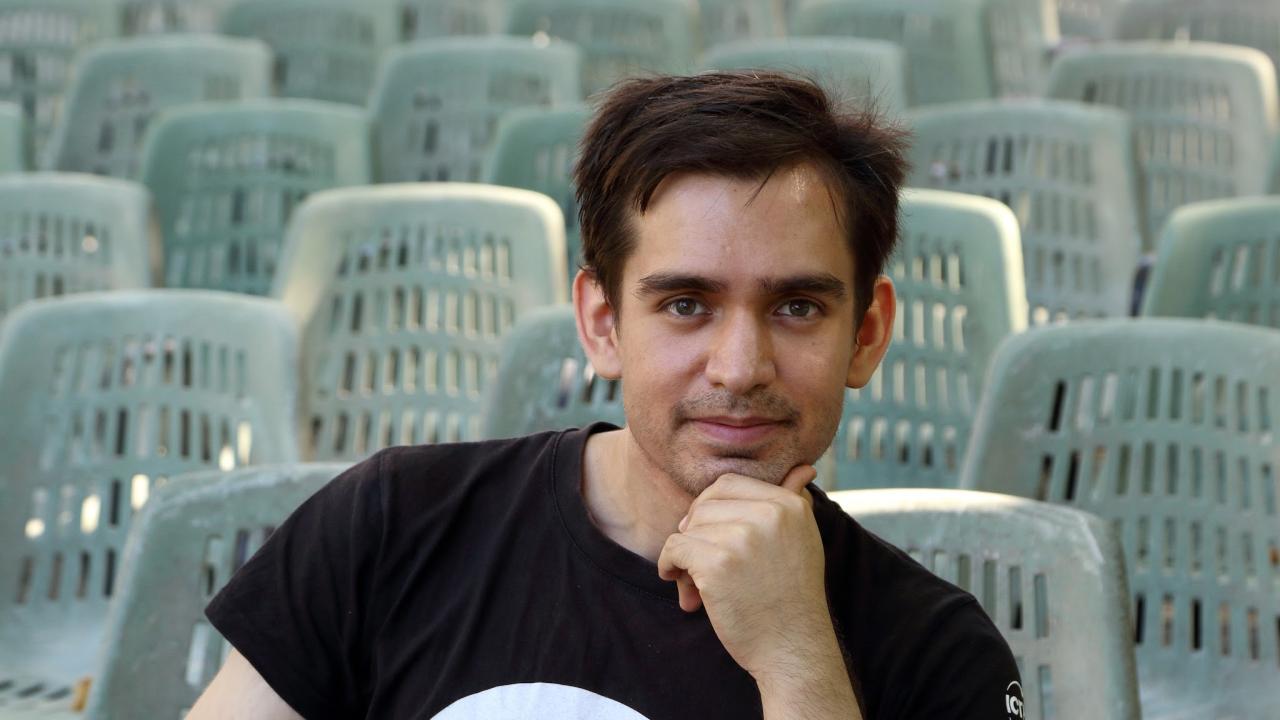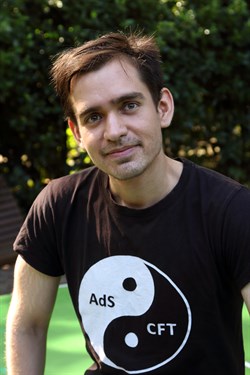
The love of investigating the universe arises in young scientists from all over the world, scientists that ICTP’s founder Abdus Salam wanted to support and train, thus enabling them to continue exploring. That’s just what the ICTP Postgraduate Diploma Programme has done for Sergio Aguilar, a student from El Salvador who is deeply interested in the complexities of quantum gravity.
“I’m fascinated by the fundamental structure of matter and the large scale structure of the universe,” says Aguilar. “Astronomy introduced me to the idea that there is something behind what you can see. So I studied physics in university, where I didn’t know yet I wanted to be a theoretical physicist. I just wanted to know more of the universe, and then advanced progressively with my studies, all the way to quantum gravity.”
 That curiosity led Aguilar to Brazil, to do a two year master’s degree at Sao Paulo State University. After a year of classes there, he then did his master’s thesis work while at ICTP as a Diploma student, completing both programmes almost simultaneously. “The ICTP is very famous, very connected,” says Aguilar. “I came here because I have met some outstanding professors who are alumni of the Diploma Programme.” Aguilar found great value in the research he did at ICTP, where his ICTP faculty advisor Kyrakios Papadodimas was very helpful as Aguilar found a research track on quantum black holes.
That curiosity led Aguilar to Brazil, to do a two year master’s degree at Sao Paulo State University. After a year of classes there, he then did his master’s thesis work while at ICTP as a Diploma student, completing both programmes almost simultaneously. “The ICTP is very famous, very connected,” says Aguilar. “I came here because I have met some outstanding professors who are alumni of the Diploma Programme.” Aguilar found great value in the research he did at ICTP, where his ICTP faculty advisor Kyrakios Papadodimas was very helpful as Aguilar found a research track on quantum black holes.
“All of the professors at ICTP are very nice. Some of the courses I took here I had already taken in my master’s degree, but the Diploma Programme professors taught the very foundations of the subjects, and they go directly to the point,” says Aguilar. His favorite course was quantum field theory, which he also studied during both his undergraduate and master’s studies. “But it was taught very clearly here, it helped me grasp it much more confidently. The professors gave really professional lectures in general.” Aguilar describes the whole Diploma course as a very intense experience, even compared to his previous master’s degree work. “There are lots of exciting times, topics to fill your head with, and lots to do. Some nights you might not sleep at all.”
Aguilar has research advice for future Diploma students: “I recommend contacting a faculty member early to do their diploma thesis with, and get started even if they have classes, because doing research is a great advantage for PhD admissions, and even beyond that. For example, in my PhD programme, there were two hundred people applying for three funded positions, and it might be even more competitive for more popular programmes. In that case, professors prioritize applicants that match well with their interests, and who have shown they can get the work done.”
The intense year of work for Aguilar and his fellow Diploma students was not yet half over when a global pandemic necessitated a lockdown in Italy and a sudden shift to remote learning. “In the beginning the shift was difficult, we all missed the in-person conversations, the gym and the cafeteria. Classes felt less participative and technical difficulties were common. But the professors were very able to adapt, and it eventually got easier and more similar to in-person learning.”
Even during a pandemic, Diploma students are finding ways to continue their studies. Aguilar will soon move to the Catholic University of Leuven (KU Leuven) in Belgium, where he has a PhD scholarship and will continue his research in quantum gravity with physicist Thomas van Riet. “The programme there is very good, there are several faculty members working on quantum gravity, as well as on related topics like quantum black holes, the swampland in string theory, the AdS/CFT correspondence, quantum cosmology, plus gravitational waves” says Aguilar. “I think it’s an ideal place, and I would recommend future students choose a PhD programme that seems made just for them but also someplace that has depth and will expand their minds. I think this programme will do that for me.”
Aguilar knows his professional road ahead may be challenging, beyond the complicated questions about how the universe works that he and his colleagues are investigating. He wants to do several postdoctoral positions after completing his PhD, “and let’s see how it goes, but I want to stay in academia.” For that, returning to El Salvador is difficult: “In my country science is not well regarded at all, even relative to other developing countries. There is only one university that offers a degree in physics, and other pure sciences. More institutions offer courses in engineering,” says Aguilar. “Academic positions are very few there, especially in physics; most graduates that find a job go into industry, which can still be very useful for the country.” Academic research and training is underdeveloped: “Only a small minority of professors have doctorates, so most professors stay only with teaching, not doing research. There’s a lack of security, scarce financial support, and few opportunities to develop as a professional. Still there are some people that have to return after attending great institutions, as they receive government scholarships, so the situation will improve progressively, and I will do my part after I gain professional experience around the world.”
“I want to be a researcher, to have interesting publications, where people can look at your ideas and find it very illuminating.” says Aguilar. His time at ICTP was quite fruitful from a research perspective, helping him figure out what research questions he wanted to pursue, and also from a cultural perspective. “Before coming here I had never met any Muslim people,” he says. “Being here helped me see a lot of cultural differences and realize that there’s a lot more that we have in common than what divides us.”
That idea is key to ICTP’s support of scientists and science communities in disadvantaged parts of the world. The pursuit of knowledge needs every brain, ICTP’s founder Abdus Salam knew, and he founded an institution dedicated to removing barriers to participation for every scientist. Supporting one scientist’s dreams and goals at a time, ICTP aims to enrich science and society through the unifying power of science. For Aguilar, it’s a powerful mission as well as a source of support: “I think the ideas of ICTP are very important, and I would like to collaborate with ICTP or its partner institutions.”
—-Kelsey Calhoun
















